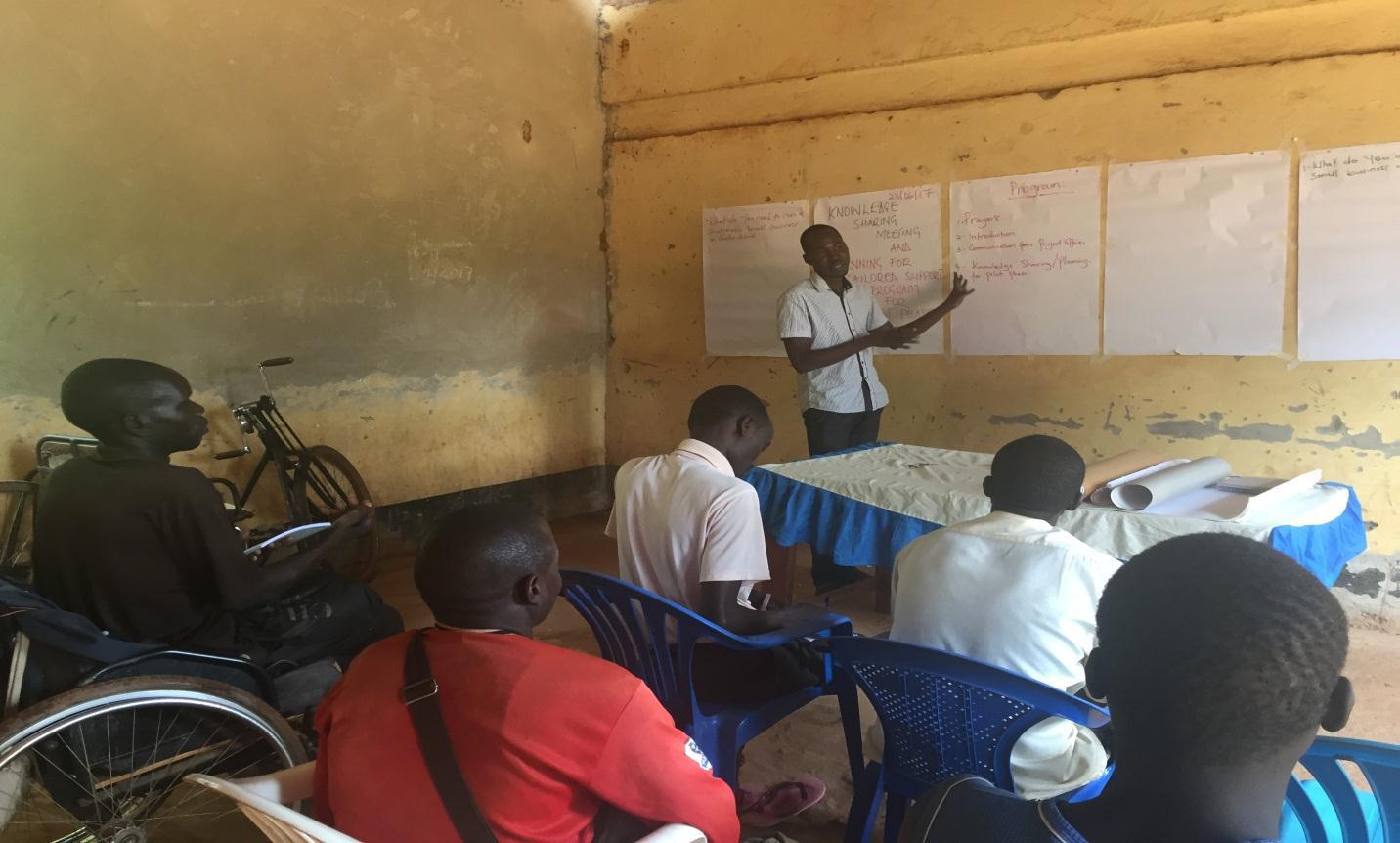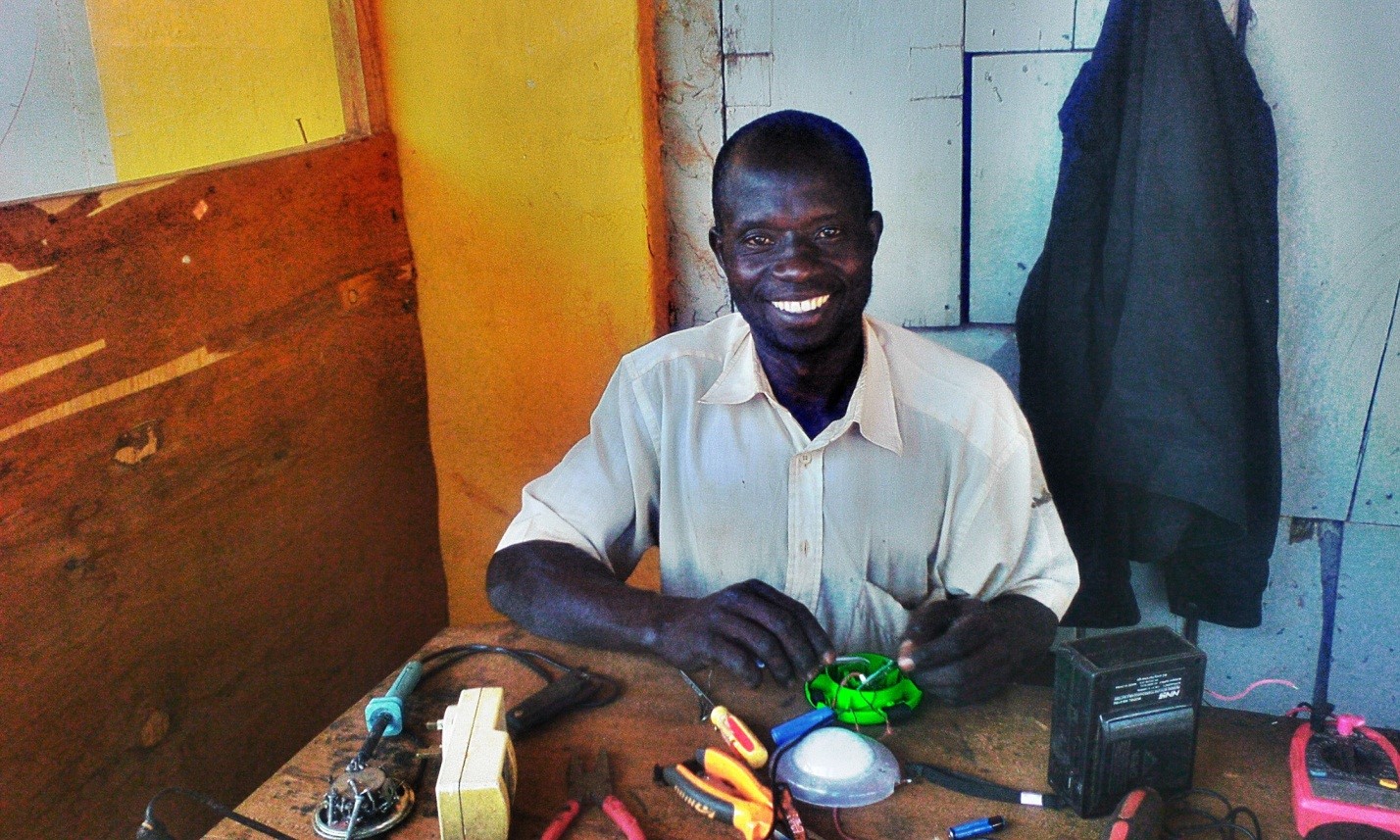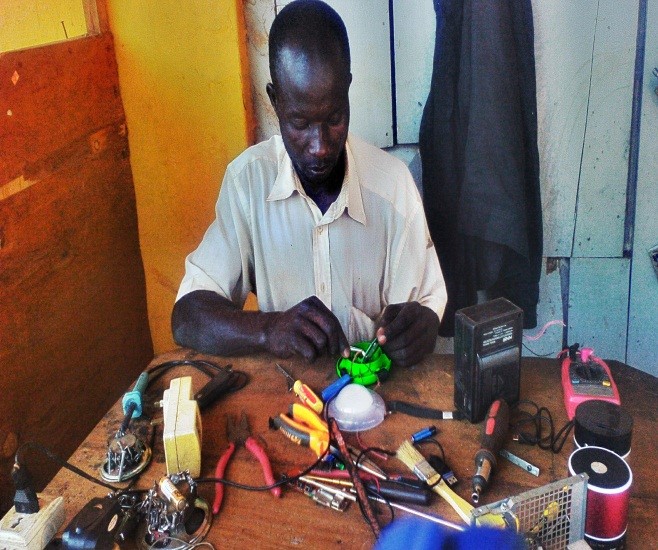
In Gulu District and Omoro district during June, Musema Faruk, the ETC @ GDPU project officer, carried out the first Knowledge Sharing and Planning meeting with the four pilot groups.
The meetings were aimed at identifying needs and gaps to be addressed in order to improve and develop their business enterprises. Once identified. step two is to engaging each group in tailor made trainings to address and solve the issues raised.
The planning meeting was based on three core areas:
Skills Gap: to identify their skills gap and design training to address them
Business Skills Gap: to identify the gaps in areas of business management skills and how to deal with surrounding environment.
Material/Tools Gap: what materials and tools will each group need to fill those gaps and how will they pay for them?

Knowledge sharing meeting with Gulu PWDs Electronics and Akera Robert business enterprise:
On Friday 23th June 2017 the ETC @ GDPU project officer shared learning and challenges with the two enterprises at GDPU Hall, Gulu Town.
The three core areas discussed in the knowledge sharing meeting with the identified youth enterprises:
Skills gap
They all lack the skills in repair of T.V whoopers, flat irons and radios, which are very marketable today.
Lack of computer knowledge
Students were trained in repair of feature phones, they have little knowledge in repair of smart phones which are an increasing part of the market.
Business skills gap
Daily Savings
Poor Customer care
Interpersonal skills and building self-esteem for the group members
Poor record keeping
Unity/Solidarity
Time management
Poor marketing skills
Material support
Purchase of computer
Spare parts
Solar/stand by generator
Safety boards
Fan

Faruk shared with the groups the three questions raised on the ETC website in May:
1: What do you need to run a sustainable small business in Gulu?
The business owner should have ‘Vision’
The business owner should be creative enough
Knowledge of business skills
Good time management
Enough capital to run the business: acquire loan to run the business and expand the business
Level of Savings should be maintained to make the business more sustainable
Strategic location is important for a small business
Ready market available
Good security
2: What do you need to set up a small business and keep it going?
Business plan: must develop a plan that will help guide you in your business.
Having startup capital. Savings culture should also be maintained in order to run a sustainable business
Record keeping is very important, it helps in tracking the business performance
Identifying a strategic location for your business, a place where people can have access to your products and services is very important.
Market research on the available demands and goods that are on market
Good communication skills in business are very important, because they build customers trust and confidence in your business and help in maintaining it.
Marketing your enterprise is very important because people will get to know what you deal in
Time management
3. What do you need to succeed in a small business in that district if you are disabled?
Register business: having a registered business well known by its branded name and to the local authority is very important if you are disabled.
Business knowledge and skills
Hard working person with vision and determination to achieve a goal is very important in a business
Good business plan and following the plan
Adequate capital: open business account in the bank or micro finance banks available in the community.
Having a savings culture as a disabled person will give room for expansion and development
Record keeping is one the most important tools to monitor the progress of the business, so it’s advisable for PWDs to keep records of their business transactions.
Marketing is important in making people know the kind of products you are dealing in or selling. Advertisement: it’s very important to increase peoples knowledge
Good customer care
Net working with other stake holders in the community they live in.
Risk taking
Good transport means available
Skilled labours: having supportive staffs that are skillful to help a disabled person in his or her business give a lot of weight for it to succeed.

Next Steps:
Suggestions for future training:
Skills training on radio, TV, woofers, flat iron and smart phones repair to increase their coverage in repair, hence out competing competitors.
Skills training in computer literacy to help them in flashing phones and identifying technical problems with other smart phones
Training in business skills to manage agriculture businesses
Training in VSLA within the enterprise to encourage the culture of savings among enterprise members.
Training in group dynamics.
Training in finding material support to develop retail business for spare parts. For example, Akera Robert has the required skills in repair of radio, TV, computer, woofers etc, he has saved shillings amounting to 3,000,000/= to buy spare parts, he has got a new space at sh 300,000/= he has a budget of 5,000,000/= but he needs support.
Groups five years plan
Sales of spare part for phones, Radio, TV and other appliances by Akera Robert
Farming, especially livestock farming achievable in one year
Opening a vocational institute, training youth with disabilities in electronic repair, Hairdressing etc.
